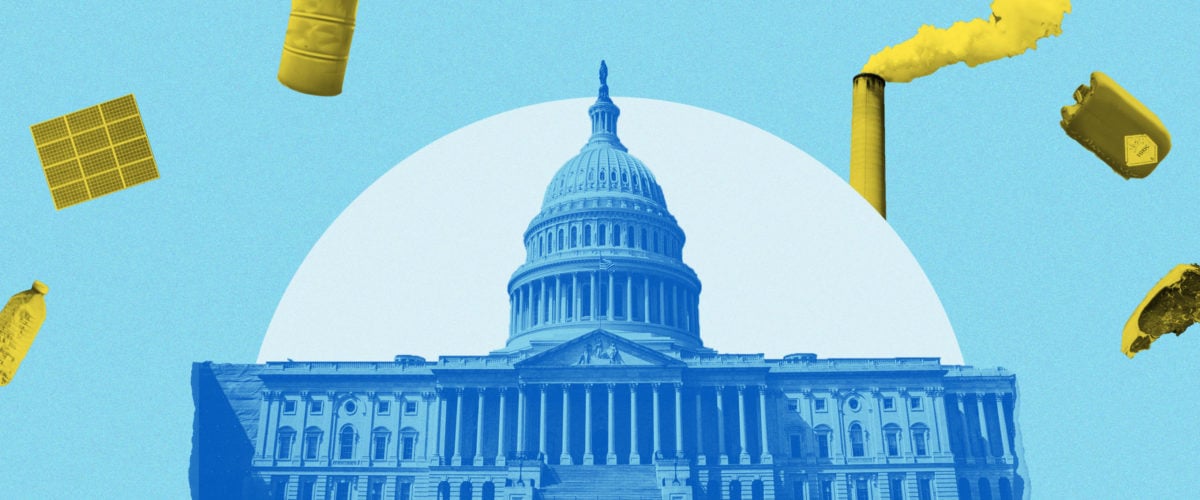Seven Victories for Democrats to Build On
Published Nov 10, 2022

In the past two years, Democrats made vital progress on food, water, and climate. Here are seven victories we will build on.
Editors note: A version of this content first appeared on Food & Water Action’s website, our affiliated organization
For the past two years, Congress has been divided by the narrowest of margins. During those years, a few conservative Democrats dictated the terms of legislation, slowing down our climate agenda. But even with that narrow Democratic majority and a moderate Democratic president, we’ve made important progress.
That progress is a testament to our movements’ organizing efforts. We’ve pushed our leaders in Washington and nationwide to hear us on clean water, safe food, and a livable climate.
The victories of the past two years are a starting point. Many have gone under the radar, but they were only possible because of the Democrats in national office. Moving forward, here are seven victories for us to build on:
1. Phasing Out Single-Use Plastics on Public Lands
In June, the Department of Interior issued an order to phase out single-use plastics on public lands by 2032. Plastics are almost entirely derived from fossil fuels and only 10% of all plastic ever made has been recycled. Moreover, plastics break down in our soils and wash into our waterways, polluting our environment, our food and our bodies.
This order will help protect our national parks and wildlife refuges from toxic plastic pollution, while reducing demand for plastic nationwide.
2. An Unprecedented Deployment of Clean Energy Funds
Under the Defense Production Act, Biden authorized the Department of Energy to grow U.S. production of clean energy technologies. This includes tech for both renewable power and conservation, like heat pumps and insulation.
Biden’s use of the Defense Production Act signals that the executive branch is finally prepared to treat climate change as it is: an existential threat to be met with a whole-of-government approach. And it recognizes that an energy transition is too dire to leave to private corporations and a wily market.
3. The House Holds Big Oil Accountable for Its Lies
For decades, fossil fuel corporations have grown profits by spreading lies about the climate crisis. But in September 2021, the House Oversight Committee began investigating their history of deceit.
The Committee, led by Rep. Carolyn B. Maloney (D-NY) and Rep. Ro Khanna (D-CA), will finally hold the industry accountable for profiting billions of dollars off lies that have kept us dependent on their climate-wrecking products.
4. Biden’s EPA Starts Regulating Toxic PFAS
In 2022, the Biden administration set new advisory levels for several PFAS chemicals. PFAS are toxic and don’t break down in the environment. Yet, manufacturers have produced products with PFAS in them for decades.
The EPA’s long-awaited advisory levels come closer to the research that maintains no level of PFAS are safe. While we face a long road ahead to tackle our PFAS problem, the EPA has taken vital first steps.
5. Proposed Rule Will Tighten Emissions Controls
In November 2021, the EPA proposed a new Clean Air Act rule to tackle climate pollution from the oil and gas industry. The rule would restrict emissions of not only new oil and gas projects, but — for the first time ever — existing ones as well.
The rule particularly targets methane emissions, which is integral to fighting climate change. The methane emitted from U.S. fossil fuel industry has a greater climate impact than all greenhouse gasses emitted by 164 other countries combined. Additionally, the EPA’s new rule targets toxic air pollution like volatile organic compounds. Such pollution disproportionately sickens low-income communities and communities of color.
6. Assistance for Environmental Justice Communities
During the first half of Biden’s term, the administration grew funding for environmental justice communities historically excluded from federal assistance. It created the first-ever Environmental Justice Advisory Council and announced the Justice40 initiative. The initiative commits 40% of benefits from federal climate and sustainability programs to EJ communities.
These commitments have already led to on-the-ground change. For example, the USDA and EPA are working on a new guidance and pilot for rural wastewater projects.
7. Biden Takes Action Against Monopolies and Corporate Greed
In 2021, an executive order outlined 70 federal actions to foster competitive markets. As Food & Water Watch and our allies reported, just a few corporations hold outsized market power in our food system. And this market power enables unjust practices to thrive.
But now, the Biden administration is targeting this market power with investigations, regulations, and legislation. For instance, the USDA proposed changes to the Packers and Stockyards Act that would give them more tools to stop meat corporations’ abusive practices. These changes would also strengthen rural economies, ensure food security, and empower family farms.
We Can and Will Move Further on Food, Water, and Climate
Democrats have achieved a lot in the past two years, but we have a long road ahead of us. To build on these victories, Food & Water Watch is working through multiple angles.
We’re shutting down fossil fuel infrastructure, supporting frontline communities, and taking polluting industries to court. At the same time, we’re publishing hard-hitting research while working with lawmakers (local, state, and federal) to craft bold legislation.
Most importantly, we’re doing what we do best — building people power to fight for a livable future for all. With strong grassroots organizing, we will continue to move the needle.
When it comes to the climate crisis, clean water, and a sustainable, just food system, we need bold action. That requires leaders who will take on the fossil fuel industry and big agribusiness. And it requires leaders who will use their power to bring about meaningful and lasting solutions.
We must continue pressuring our leaders to be bold. That’s the only way we’ll see more and greater victories like these.
With your help, we’ll have plenty of wins ahead of us!
Enjoyed this article?
Sign up for updates.
TO TOP


